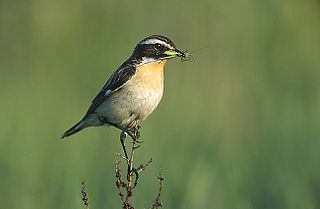
Chats are a group of small Old World insectivorous birds formerly classified as members of the thrush family (Turdidae), but following genetic DNA analysis, are now considered to belong to the Old World flycatcher family (Muscicapidae).

The African paradise flycatcher is a medium-sized passerine bird. The two central tail feathers of the male are extended into streamers that commonly are more than twice as long as the body. The female tail feathers are of moderate length and without streamers. The upper parts of the male body, wings, and tail are boldly coloured in chestnut or rusty shades, but the underparts and the head are variably grey to blue-gray, with the head of the mature male being darker, commonly glossy black with greenish highlights. The beak and other bare areas, including a wattle ring round the eye, match the colour of the surrounding feathers. The female coloration is similar, though not so showy and glossy and with the head paler.

The magpie starling is a member of the starling family from eastern Africa.

Speke's weaver is a familiar East African songbird.

The Cape robin-chat is a small passerine bird of the Old World flycatcher family Muscicapidae. It has a disjunct range from South Sudan to South Africa.

The black-bellied bustard, also known as the black-bellied korhaan, is an African ground-dwelling bird in the bustard family.
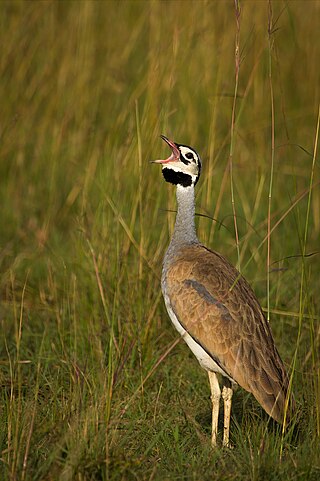
The white-bellied bustard or white-bellied korhaan is an African species of bustard. It is widespread in sub-Saharan Africa in grassland and open woodland habitats.

The rattling cisticola is a species of bird in the family Cisticolidae which is native to Africa south of the equator, and parts of East Africa. It is a common to abundant species in open savanna and scrubland habitats, whether in arid, moist or upland regions. Especially during summer, it is highly conspicuous due to its strident and repetitive call-notes from prominent perches.
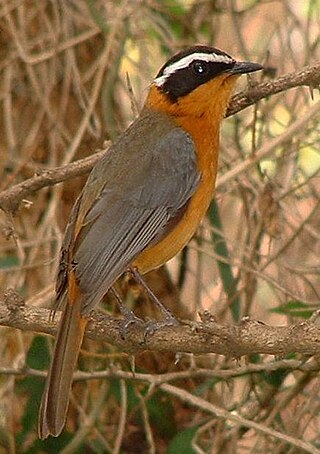
The white-browed robin-chat, also known as Heuglin's robin, is a species of bird in the family Muscicapidae. Found in east, central and southern Africa, its natural habitats include riverine forest and thickets, and it is also found near humans. The IUCN classifies it as a least-concern species.

Rüppell's robin-chat is a species of bird in the family Muscicapidae, that is native to the Afrotropics. It is named for the German naturalist Eduard Rüppell.

The white-browed scrub robin, also known as the red-backed scrub-robin, is a species of bird in the family Muscicapidae. It is native to sub-Saharan Africa, especially East and southern Africa. Within range, its Turdus-like song is one of the often-heard sounds of the bush. The flitting of the tail is characteristic of this species, but also of some near relatives.

The bearded scrub robin, also known as the eastern bearded scrub robin, is a species of bird in the family Muscicapidae. It is found in eastern and southern Africa.

The rosy-throated longclaw, also known as the rosy-breasted longclaw is a species of bird in the family Motacillidae. It is found in Angola, Botswana, Democratic Republic of the Congo, Kenya, Malawi, Mozambique, Namibia, South Africa, Tanzania, Zambia, and Zimbabwe. Its natural habitat is subtropical or tropical seasonally wet or flooded lowland grassland.
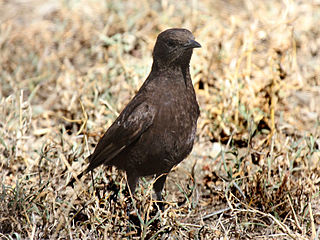
The anteater chat or northern anteater-chat is a species of bird in the family Muscicapidae.It is found in Burkina Faso, Cameroon, Central African Republic, Chad, Gambia, Kenya, Mali, Mauritania, Niger, Nigeria, Senegal, Sudan, and Tanzania. Its natural habitats are dry savanna, subtropical or tropical dry lowland grassland, and subtropical or tropical high-altitude grassland.

Myrmecocichla is a genus of passerine birds in the Old World chat and flycatcher family Muscicapidae.
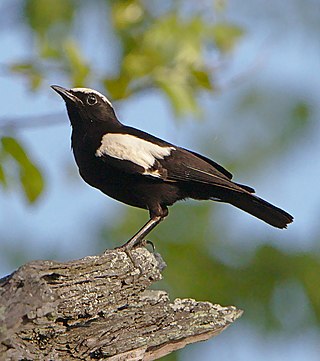
Arnot's chat, also known as the white-headed black-chat, is a species of bird in the chat and flycatcher family Muscicapidae. The species is found in southern Africa from Rwanda and Angola to South Africa.

The mocking cliff chat, mocking chat or cliff chat, is a species of chat in the family Muscicapidae which occurs in rocky habitats in much of eastern Sub-Saharan Africa.
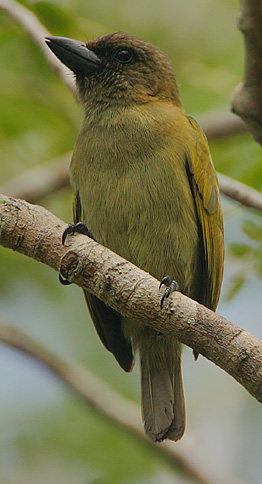
The green barbet is a species of bird in the Lybiidae family. It is found in Kenya, Tanzania, Malawi, Mozambique and South Africa. It occurs in forests from sea level to 1,800 metres (5,900 ft). Its isolated populations are vulnerable to forest clearing.

The bar-tailed trogon is a species of bird in the family Trogonidae. It is a resident bird to central Africa that eats primarily insects and fruits.

The Tsavo sunbird is a small passerine bird of Kenya and Tanzania. It is sometimes lumped with the purple-banded sunbird.





















